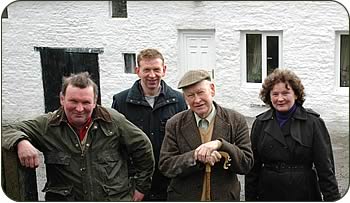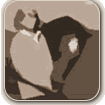Jennifer MacKenzie is an agricultural photo journalist with almost 30 year's experience. Operating from her base in Cumbria, Jennifer undertakes mainly industry-related freelance writing and photography.
Traditional Breeds at Farney Shield
Long, hard winters have led the Wallace family to continue to run their Northumberland hill farm along traditional lines as they have done since 1962.
And Blue Grey heifers – the hardy cross of the Whitebred Shorthorn bull and the Galloway cow – are a bonus for Martin and Marina Wallace and their sons Trevor and Kevin.
 |
| Martin and Marina Wallace and their sons Trevor and Kevin |
Farney Shield lies high in the hills south of the village of Ninebanks near Allendale. The farmhouse itself stands at around 1,200ft above sea level.
The family farms a total of 710 acres of mainly rough grazing and meadow ground, including 120 acres of better ground at Hexham.
Farney Shield carries a herd of 70 Galloway cows, with up to seven
strong bulling heifers being bought each autumn at Carlisle for
herd replacements. There are also grazing rights on Allendale Common.
Blue Grey Heifers
Integral to the traditional system for the last three decades is the Whitebred Shorthorn to produce Blue Grey heifers, which are in increasing demand as hardy suckler cows, and bullocks, now more and more sought after by butchers who specialise in traditional breeds.
“The cattle we run are best suited for the hills and a harsh environment. Some of the cows are well into their teens and we have no trouble calving them to the Whitebred,” said Martin Wallace.
“The weather forecasts govern our farming. Continental cattle couldn’t survive on our farm. Our cows are outside for two months longer in the winter than other breeds.
“When we buy in Galloway replacements the heifers have to be good on their legs to cope with the heavy land and we look for good milking ability,” he added.
Recent replacements have come from the Waughs of Kilnstown, Forster of Smithsteads and Graham Noble, Demesne.
Female lines in the small herd of Whitebred Shorthorns go back to the original cows. Bulls are tried at home before any surplus are sold privately – last year one sold to the Orkneys and another went to Buckinghamshire.
The easy-care cattle were all calved outside until the Wallaces joined the North Pennines Environmentally Sensitive Area scheme 13 years ago. The farm has a number of species of birds and in particular black game.
Blue Grey heifers are all sold at the annual Newcastleton sale at the end of October which attracts around 1,000 head of cattle. Last autumn they sold up to £750 a head.
 |
| Blue Grey Heifers |
The heifers which are sold at between 20 and 26 months old have ready buyers on hill and marginal farms from as far afield at Tain in the north of Scotland to Cornwall in the south. One borders beef farm has around 70 Blue Grey cows from Farney Shield.
Last year heifers were sold to graze Kilnsey Crag near Skipton as part of the Limestone Project, an environmental project looking at the success of native breeds of cattle in helping re-generation of plant species which are in decline.
Bullocks are sold at 18 months old at the special Kirkcambeck autumn sale at Longtown Mart with the remainder selling in the spring, making up to £650 each.
The cattle are housed and straw bedded from mid December to mid April, with the majority of cows calving inside. There are few calving difficulties which helps keep vets bills down.
They are fed big bale silage and hay, the latter being made off the drier ground. Blue Grey calves are fed 1kg a head of concentrate.
As well as being noted for breeding Blue Greys, the Wallaces have a name for their Mule gimmer lambs.
They run 800 Swaledales, which includes 150 hoggs, and have a small flock of 14 Bluefaced Leicesters. Four hundred Swaledales are wintered away on lowland farms in Northumberland and Cumbria.
Of the Swaledales, 200 are bred pure to produce flock replacements with 450 crossed with the Bluefaced Leicester.
North of England Mule gimmer lambs are sold at Lazonby where 288 averaged £83 in 2004. They are in demand from flockmasters across the country.
Wether lambs are sold finished through Hexham Mart from December through to April, the majority being finished inside.
The Swaledales crossed with the Leicester start lambing at the beginning of April with the pure-breds starting later in the month.
Bluefaced Leicester rams are not used as lambs and any surplus are sold as shearlings at Lazonby or Hawes.

